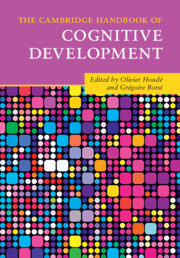Book contents
- The Cambridge Handbook of Cognitive Development
- The Cambridge Handbook of Cognitive Development
- Copyright page
- Contents
- Figures
- Tables
- Contributors
- Introduction
- Part I Neurobiological Constraints and Laws of Cognitive Development
- Part II Fundamentals of Cognitive Development from Infancy to Adolescence and Young Adulthood
- Part III Education and School-Learning Domains
- 25 Linking Cognitive Neuroscientific Research to Educational Practice in the Classroom
- 26 Literacy
- 27 Reasoning in Mathematical Development
- 28 Children’s Scientific Reasoning Skills in Light of General Cognitive Development
- 29 Working Memory Training
- 30 Interventions for Improving Executive Functions during Development
- 31 Curiosity-Driven Learning in Development
- 32 Neurocomputational Methods
- Index
- Plate Section (PDF Only)
- References
29 - Working Memory Training
From the Laboratory to Schools
from Part III - Education and School-Learning Domains
Published online by Cambridge University Press: 24 February 2022
- The Cambridge Handbook of Cognitive Development
- The Cambridge Handbook of Cognitive Development
- Copyright page
- Contents
- Figures
- Tables
- Contributors
- Introduction
- Part I Neurobiological Constraints and Laws of Cognitive Development
- Part II Fundamentals of Cognitive Development from Infancy to Adolescence and Young Adulthood
- Part III Education and School-Learning Domains
- 25 Linking Cognitive Neuroscientific Research to Educational Practice in the Classroom
- 26 Literacy
- 27 Reasoning in Mathematical Development
- 28 Children’s Scientific Reasoning Skills in Light of General Cognitive Development
- 29 Working Memory Training
- 30 Interventions for Improving Executive Functions during Development
- 31 Curiosity-Driven Learning in Development
- 32 Neurocomputational Methods
- Index
- Plate Section (PDF Only)
- References
Summary
As commonly defined in psychology, working memory (WM) is the ability to maintain and manipulate information in active attention. It includes narrow abilities such as auditory short-term storage, visual-spatial short-term storage, and attentional control. Despite a common definition, working memory is still quite a heterogeneous concept, and it can be measured in many distinct ways. WM was first proposed to be the memory for plans of future action (Miller et al., 1960). Later, the dual-store concept of WM by Alan Baddeley came to dominate cognitive psychology for a long time (Baddeley & Hitch, 1974). In that model, there are two separate domain-specific storage systems: the phonological loop (which stores verbal content) and the visuospatial sketchpad (which stores visuospatial content). And, as in many other models of WM since then, Baddeley’s model proposes a central executive system (or attentional/processing component) that controls the flow of information from and to the two storage systems.
- Type
- Chapter
- Information
- The Cambridge Handbook of Cognitive Development , pp. 606 - 622Publisher: Cambridge University PressPrint publication year: 2022



